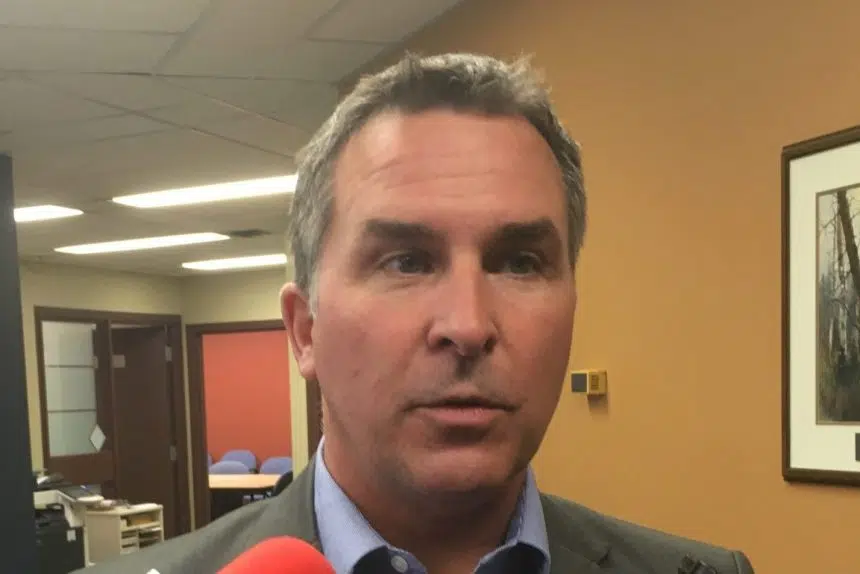Patrick Maze said schools in the province are likely already “too far gone” to limit the spread of the Omicron COVID-19 variant in the coming days and weeks.
“I think it’s past that point now, unfortunately,” said Maze, the president of the Saskatchewan Teachers’ Federation (STF).
Maze said the federation requested the return to school in Saskatchewan be delayed for two days so it could address two concerns: Cohorting and staff shortages.
“You can’t just do that on a Tuesday morning when students return,” Maze said Tuesday, when more students in the province returned to their elementary and high schools.
The province did not grant the STF that time, despite many other problems delaying school starts and preparing to start winter semesters with online learning.
Now, with many schools down anywhere between five and eight teachers due to symptoms and positive COVID-19 tests, the STF and teachers it represents are frustrated seeing problems they predicted coming to fruition.
“That impacts our ability to create a safe learning environment for students,” Maze said.
“You kind of need a full staffing complement to be able to have specific staff assigned to some students,” he added. “You can’t do that when you’re understaffed.”
Having not been able to limit the intermingling of teachers and students over the past two days, Maze predicted online learning will be inevitable in the near future.
The failure of the provincial government to heed the requests and needs of schools in the province, Maze said, has impacted the morale of Saskatchewan teachers. In a Facebook post, one teacher commented, “I don’t think I have ever felt as disrespected as a worker and a human as I have today.”
Saskatchewan is the only province in Canada that didn’t delay the return to school. As the Saskatchewan Teachers’…
Posted by Patrick Maze on Tuesday, January 4, 2022
While many may consider Omicron similar to the flu, Maze noted even if that is what the data comes to support, students and teachers must stay home anytime they are sick.
“It is significantly impacting our ability to run schools,” he said.
Public and Catholic school divisions in both Regina and Saskatoon report not much has changed. Schools reported they are following masking and distancing protocols while maintaining proper hygiene.
Twylla West, the spokesperson for the Regina Catholic School Division, said the division also is cohorting as much as possible, although it has not done any ventilation enhancements.
“We continue to follow all health directives from the health experts, and can’t speak from that angle beyond ensuring you and all our communities that we’re doing what is asked of us by local public health officers, with whom we speak daily,” West said.
“Each wave of the pandemic brings something new, but various safety measures remain more or less the same,” said Derrick Kunz with Greater Saskatoon Catholic Schools. “We continue to use the layered approach encouraged by health officials: mask use, recommend vaccination for those eligible, use of rapid antigen tests, doing a daily health check and staying home if not feeling well, practising proper hand hygiene, maximizing airflow and ventilation, etc.”
He anticipated cases in schools might reflect community activity in the coming days and weeks.
Maze said he thinks the province is more focused on politics in its decision not to implement further restrictions in the face of growing Omicron cases in the province.
“I think the push to keep schools open seems like more of a function of the economy and a function of Premier Moe’s concern for people who are anti-mask and anti-vaccine as opposed to doing the right thing according to health professionals, and also listening to professionals in education,” Maze said.
The STF president said education professionals should be consulted more.
The provincial government declined to provide the education minister to answer questions on Tuesday but said the protocols that are in place and $150 million that school divisions have been given to support students “as we manage throughout the pandemic has proven to be successful.”
The province and the four school divisions in Regina and Saskatoon emphasized the importance of rapid testing before returning to school, with some schools encouraging daily testing for students before attending classes in person.
About 250,000 rapid tests are allotted to be sent to schools, the province added. It also said schools in Saskatchewan currently have access to disposable, medical grade surgical masks.
“These significant measures will support the continuation of in-class learning as we continue to learn with COVID-19 in our daily lives,” it said.
Maze predicted that by the end of the week, there could be many students and teachers home sick, further affecting schools’ ability to operate.
“Now that we’ve rushed back too quickly, it’s really going to be difficult to go back to continue in-person learning,” Maze said.
Several school divisions and Maze noted schools are prepared to make the switch to online learning whenever that becomes necessary.
“I think it’s pretty much inevitable now that we’re on a bad path and unfortunately a lot of this could have been prevented,” Maze said.











